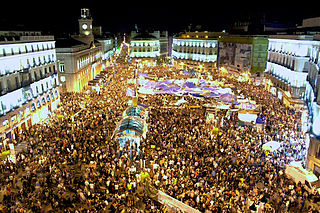 W
WThe anti-austerity movement in Spain, also referred to as the 15-M Movement, and the Indignados Movement, was a series of protests, demonstrations, and occupations against austerity policies in Spain that began around the local and regional elections of 2011 and 2012. First starting on 15 May 2011, many of the subsequent demonstrations spread through various social networks such as Real Democracy NOW and Youth Without a Future.
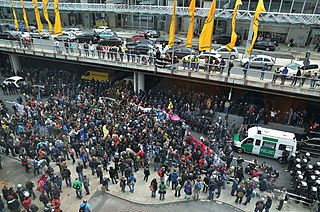 W
WBlockupy is a movement protesting against austerity. The Blockupy alliance includes trade unions and Germany's Linkspartei.
 W
WThe 2014 unrest in Bosnia and Herzegovina was a series of demonstrations and riots that began in the northern town of Tuzla on 4 February 2014 but quickly spread to multiple cities in Bosnia and Herzegovina, including Sarajevo, Zenica, Mostar, Jajce, and Brčko, among others, for social reasons and with the aim of overthrowing the government. The riots were the most violent scenes the country had seen since the end of the Bosnian War in 1995. The rioting largely took place in the entity of Federation of Bosnia and Herzegovina, and the same level of unrest or activism did not occur in Republika Srpska.
 W
WThe boycott of Maryland's 1st congressional district is a boycott of the 1st congressional district of Maryland in response to 2014 congressional legislation that interfered with the ability of the District of Columbia to pass its own laws. The boycott was prompted by an appropriation amendment by Maryland Representative Andy Harris that would nullify D.C. laws on marijuana decriminalization.
 W
WThe 2014 protests in Brazil, also known as There wont be a Cup or Fifa go home were public demonstrations in several Brazilian cities in response to the 2014 FIFA World Cup and other social issues, realized by many Social movements, mostly in the capitals where the megaevent was happening, Their main criticism was the high government spending on the World Cup to the detriment of low investment in public services. Furthermore, they criticized forced evictions and lack of policies in favor of decent housing, urban militarization and police violence. Several categories of workers also added demands in favor of better conditions for Work
 W
WThe 2013–2014 Bulgarian protests against the Oresharski cabinet was a series of demonstrations that were held in Bulgaria, mainly in the capital Sofia, against the left-wing coalition cabinet of Oresharski. The demonstrations started on 28 May 2013, but actual large-scale protests did not emerge until 14 June. While the trigger factor for the demonstrations was the controversial appointment of Delyan Peevski as head of DANS in June 2013, the public discontent stemmed from a variety of causes, to a large extent connected to the general nature of the BSP-MRF governing coalition and perceived legitimacy issues surrounding political processes in Bulgaria. They ended in July 2014 with the resignation of the Oresharski government.
 W
WThe Burkinabé uprising was a series of demonstrations and riots in Burkina Faso in October 2014 that quickly spread to multiple cities. They began in response to attempts at changing the constitution to allow President Blaise Compaoré to run again and extend his 27 years in office. Pressure for political change came from civil society and in particular from the country's youth. Following a tumultuous day on 30 October, which included the involvement of former Defence Minister Kouamé Lougué and the burning of the National Assembly and other government buildings as well as the ruling Congress for Democracy and Progress party's headquarters, Compaoré dissolved the government and declared a state of emergency before eventually fleeing to Côte d'Ivoire with the support of President Alassane Ouattara.
 W
WAnti-government protests were ongoing in Cambodia from July 2013 to July 2014. Popular demonstrations in Phnom Penh took place against the government of Prime Minister Hun Sen, triggered by widespread allegations of electoral fraud during the Cambodian general election of 2013. Demands to raise the minimum wage to $160 a month and resentment at Vietnamese influence in Cambodia have also contributed to the protests. The main opposition party refused to participate in parliament after the elections, and major demonstrations took place throughout December 2013. A government crackdown in January 2014 led to the deaths of 4 people and the clearing of the main protest camp.
 W
WThe Catalan Way 2014, or "V", was a large gathering in Barcelona on 11 September 2014, the National Day of Catalonia, in support of the Catalan self-determination referendum of 2014 and of Catalan independence from Spain. It was organized by "Now is the Time", a unified campaign organised and funded by the Assemblea Nacional Catalana (ANC) and the Òmnium Cultural. Two massive senyeres, created by demonstrators wearing red and yellow T-shirts forming a giant human mosaic, filled the Diagonal and the Gran Via, and came together at the vortex in Plaça de les Glòries, forming a giant "V", symbolizing "victory", "vote" and "will". The "V" was 11 kilometers in length and about 200,000 square meters in area. Estimates of the attendance varied: though the Spanish government's office in Catalonia put it at about 500,000, Barcelona's Municipal Police put it at 1.8 million. An independent statistical analysis by the Autonomous University of Barcelona calculated that 900,000 people attended. The organisers, the grassroots Assemblea Nacional Catalana, said it was one of the biggest peaceful mobilizations in European history.
 W
WThe Day We Fight Back was a one-day global protest against mass surveillance by the US National Security Agency (NSA), the UK GCHQ, and the other Five Eyes partners involved in global surveillance. The "digital protest" took place on February 11, 2014 with more than 6,000 participating websites, which primarily took the form of webpage banner-advertisements that read, "Dear Internet, we're sick of complaining about the NSA. We want new laws that curtail online surveillance. Today we fight back." Organizers hoped lawmakers would be made aware "that there's going to be ongoing public pressure until these reforms are instituted."
 W
WEuromaidan was a wave of demonstrations and civil unrest in Ukraine, which began on the night of 21 November 2013 with public protests in Maidan Nezalezhnosti in Kyiv. The protests were sparked by the Ukrainian government's decision to suspend the signing of an association agreement with the European Union, instead choosing closer ties to Russia and the Eurasian Economic Union. The scope of the protests soon widened, with calls for the resignation of President Viktor Yanukovych and his government. The protests were fueled by the perception of "widespread government corruption", "abuse of power", and "violation of human rights in Ukraine". Transparency International named President Yanukovych as the top example of corruption in the world. The situation escalated after the violent dispersal of protesters on 30 November, leading to many more protesters joining. The protests led to the 2014 Ukrainian revolution.
 W
WThe Hamburg protests were a large series of demonstrations in Hamburg, Germany, in December 2013 and January 2014.
 W
WA series of sit-in street protests, often called the Umbrella Revolution and sometimes used interchangeably with Umbrella Movement, or Occupy Movement, occurred in Hong Kong from 26 September to 15 December 2014.
 W
WIn late October 2014, anti-government demonstrations were held in Hungary, which were triggered by the government's announcement of a proposal to include the taxation of Internet usage in the Taxation Law, to be in effect from 2015. The ruling right-wing coalition's larger party, Fidesz made their proposal public on October 21, which is meant to extend the existing telecommunications tax to Internet usage. The proposal designated a 150 HUF/GB tax rate paid by the internet service providers. Later, a cap was proposed: HUF 700 per month (individuals) or HUF 5,000 (companies).
 W
WInternet Slowdown Day, part of the "Battle for the Net" initiative, was a series of coordinated protests organized to promote net neutrality and regulations for the equal treatment of Internet traffic, occurring on September 10, 2014. The official site explains: "On September 10th, sites across the web will display an alert with a symbolic 'loading' symbol and promote a call to action for users to push comments to the FCC, Congress, and the White House."
 W
WThe anti-austerity movement in Ireland saw major demonstrations from 2008 to 2015.
 W
WThe Hok Kolorob Movement or the 2014 Jadavpur University student protest, was a four-month long series of protests by the students of Jadavpur University in Kolkata, India that began on 3 September 2014. The term "Hok Kolorob" was originally the title of a song by Bangladeshi singer Arnob and began to be used as a hashtag on Facebook.
 W
WKiss of Love protest was a non-violent protest against moral policing which started in Kerala, India, and later spread to other parts of India.
 W
WThe 2014 Kobanî protests in Turkey are large-scale rallies by pro-People's Defense Units (YPG) protestors in Turkey in autumn 2014, as a spillover of the crisis in Kobanî. Large demonstrations unfolded in Turkey, and quickly descended into violence between protesters and the Turkish police. Several military incidents between Turkish forces and militants of the Youth Wing of the Kurdistan Workers' Party (PKK) in south-eastern Turkey, contributed to the escalation. Protests then spread to various cities in Turkey. Protesters were met with tear gas and water cannons, and initially 12 people were killed. A total of 31 people were killed in subsequent protesting up to 14 October.
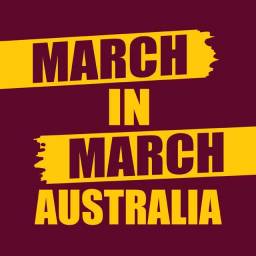 W
WMarch in March refers to a series of marches which were held around Australia on 15–16 March 2014, and in Canberra, the national capital, on 17 March 2014, a parliamentary sitting day. The marches were attended by at least eighty thousand people across Australia and were peaceful. Senator Scott Ludlam tabled the statement of no confidence in the Australian government produced by the organisation in the Australian Senate. Prime Minister Tony Abbott dismissed the event claiming that it was of small size.
 W
WThe 2014–2018 Nicaraguan protests were a series of protests against President of Nicaragua Daniel Ortega and actions performed by his government, the dismantling of the opposition, and violence against peaceful protesters. The protests began in 2014, when the construction of the Nicaragua Canal was about to begin, and several hundred protesters blocked roads and clashed with police during the groundbreaking of the canal. Tens of thousands of Nicaraguans began to protest against President Ortega for what they believe to be a corrupt electoral system.
 W
WThe 2014 Azadi movement, or 2014 Freedom movement also known as the tsunami march, was a protest march in Pakistan from 14 August to 17 December 2014. The march was organised by the Pakistan Tehreek-e-Insaf (PTI) party, opposing Prime Minister Mian Nawaz Sharif over claims of systematic election-rigging by the Pakistan Muslim League (N) (PML-N) in the 2013 general election that was later order for reelection and PTI won one out of three seats from the four claimed seats. Party leader Imran Khan announced plans for an August march from Lahore to Islamabad with a group of protesters in a PTI jalsa (demonstration) in Bahawalpur on 27 June 2014.
 W
WThe People's Climate March (PCM) was a large-scale activist event orchestrated by the People's Climate Movement to advocate global action against climate change, which took place on Sunday, September 21, 2014, in New York City, along with a series of companion actions worldwide, many of which also took the name People's Climate March. With an estimated 311,000 participants, the New York event was the largest climate change march in history. Described as "an invitation to change everything," the march was called in May 2014 by the global advocacy human rights group Avaaz and 350.org, the environmental organization founded by writer/activist Bill McKibben, and it was endorsed by "over 1,500 organizations, including many international and national unions, churches, schools and community and environmental justice organizations." It was conceived as a response to the scheduled U.N. Climate Summit of world leaders to take place in New York City two days later, on September 23.
 W
WProtests against the 2013 Egyptian coup d'état erupted in July 2013. Immediately following the removal of President Mohamed Morsi by the Egyptian Armed Forces on 3 July 2013 amid demonstrations against Morsi's rule, many protesters amassed near the Rabia Al-Adawiya Mosque to call for Morsi's return to power and condemn the military, while others demonstrated in support of the military and interim government. Deadly clashes such as Rabaa massacre continued for several days, with three particularly bloody incidents being described by officials as "massacres" perpetrated by security forces. During the month of Ramadan, prime minister Hazem al-Beblawy threatened to disperse the ongoing Pro-Morsi sit-ins in Rabaa al-Adaweya square and al-Nahda square. The government crackdown of these protests occurred in a violent dispersal on 14 August 2013. In mid-August, the violence directed by the army towards the protesters escalated, with hundreds killed, and the government declaring a month-long nighttime curfew.
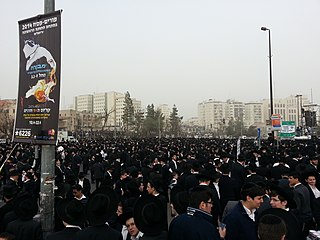 W
WThe protest against conscription of yeshiva students was a mass rally held in Jerusalem on March 2, 2014. Its organizers called for a "million-man protest" against a proposed law overturning the exemption from military service for Haredi talmudical students and criminalizing those who refused to enlist in the Israel Defense Forces. From 300,000 to 600,000 people gathered in one of the largest protests in Israeli history.
 W
WThe 2012–2015 unrest in Romania refers to a prolonged period of civil unrest and political scandals in Romania, which took magnitude after the second half of the 2000s. The wave of civil demonstrations started in January 2012, once with the introduction of a new health reform legislation. The protests were fueled by the austerity measures applied in May 2010, but also by the unpopularity of Băsescu-backed Boc government. The demonstrations were characterized by widespread rioting and acts of vandalism. The political situation precipitated, so Prime Minister Emil Boc decided to step down on 6 February 2012.
 W
WThe 2012–2014 Romanian protests against shale gas are an ongoing series of protests in major Romanian cities against exploitation of shale gas through controversial method of hydraulic fracturing. The main causes of these protests are the pollution of groundwater and environment, but also the threat of generating earthquakes. The protesters claim the resignation of Prime Minister Victor Ponta, because he suddenly changed his position on the project. Before the electoral campaign of 2012, he opposed shale drilling, and today he supports it with any risks, on the grounds that Romania's energy independence is a national project.
 W
WThe 2014 anti-war protests in Russia refers to a series of anti-war demonstrations opposing the Russian military intervention in Ukraine that took place in Russia in 2014. Protesters held two anti-war protest rallies on 2 and 15 March 2014. The latter, known as the March of Peace, took place in Moscow a day before the Crimean referendum. The protests have been the largest in Russia since the 2011–13 Russian protests by the Russian opposition against the alleged electoral fraud committed by United Russia during the 2011 Russian legislative election. Reuters reported that around 20,000 people participated in the 15 March demonstrations.
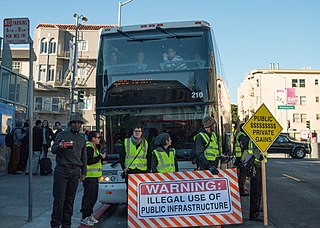 W
WThe San Francisco tech bus protests were a series of community-based activism held by residents of the San Francisco Bay Area beginning in late 2013, when the use of shuttle buses employed by local area tech companies became widely publicized. The tech buses have been called "Google buses" although that term is pars pro toto, in that many other tech companies such as Apple, Facebook, Yahoo and Genentech also pay for private shuttle services.
 W
WThe Sunflower Student Movement is associated with a protest movement driven by a coalition of students and civic groups that came to a head between March 18 and April 10, 2014, in the Legislative Yuan and, later, also the Executive Yuan of Taiwan. The activists protested the passing of the Cross-Strait Service Trade Agreement (CSSTA) by the then ruling party Kuomintang (KMT) at the legislature without clause-by-clause review.
 W
WThe 2013–2014 Thai political crisis was a period of political instability in Thailand. Anti-government protests took place between November 2013 and May 2014, organised by the People's Democratic Reform Committee (PDRC), a political pressure group led by former Democrat Party parliamentary representative (MP) Suthep Thaugsuban. The crisis eventually resulted in the removal of incumbent Prime Minister Yingluck Shinawatra, a coup d'état, and the establishment of a military junta.
 W
WThe 2014 Venezuelan protests began in February 2014 when hundreds of thousands of Venezuelans protested due to high levels of criminal violence, inflation, and chronic scarcity of basic goods because of policies created the Venezuelan government. The protests have lasted for several months and events are listed below according to the month they had happened.
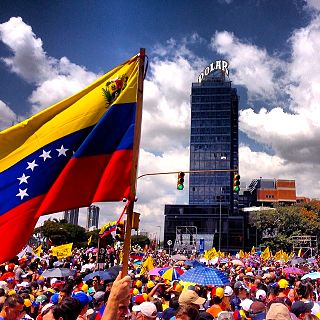 W
WIn 2014, a series of protests, political demonstrations, and civil insurrection began in Venezuela due to the country's high levels of urban violence, inflation, and chronic shortages of basic goods attributed to economic policies such as strict price controls. Mass protesting began in earnest in February following the attempted rape of a student on a university campus in San Cristóbal. Subsequent arrests and killings of student protesters spurred their expansion to neighboring cities and the involvement of opposition leaders. The year's early months were characterized by large demonstrations and violent clashes between protesters and government forces that resulted in nearly 4,000 arrests and 43 deaths, including both supporters and opponents of the government.
 W
W2014 Vietnam anti-China protest was a series of anti-China protests followed by unrest and riots across Vietnam in May 2014, in response to China deploying an oil rig in a disputed region of the South China Sea.
 W
WVigils for Peace is the name of regular series of vigils that have taken place on Mondays in many cities in Germany, Austria, and Switzerland since March 2014. The vigils are explicitly not left-wing or right-wing in political orientation, although they are inspired by the Monday demonstrations in East Germany that took place in 1989 and 1990.
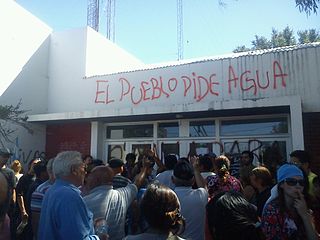 W
WWater supply problems in Caleta Olivia occurred on 2014 and culminated in a series of protests about the lack of water produced by the rupture of the aqueduct Jorge Carstens. The Sarmiento, Comodoro Rivadavia and Rada Tilly areas of Argentina were affected. The water shortage began on the 10th of February with a rupture near ti Cerro Dragón. This issue left the area of San Jorge Gulf without water.